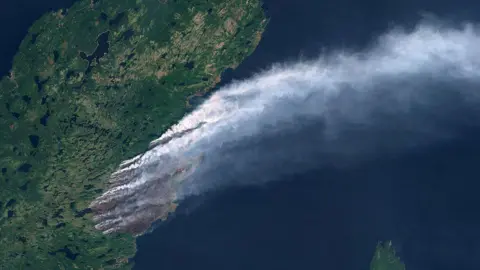Nadine YoussefSenior Canada correspondent
 Gety pictures
Gety picturesWith the outbreak of deadly forest fires in the Canadian province of Manitoba this summer, Republican lawmakers in the nearby United States formulated messages that Canada will be responsible for smoke drift in the south.
“Our sky is suffocated by the smoke of the wildfire that we did not start and cannot control,” wrote Calvin Callen, the representative of the Republican State from Wisconsin, in a letter dated in early August.
Callen, along with legislators from Iowa, Minnesota and North Dakota, submitted an official complaint to the US Environmental Protection Agency (EPA), which urges an investigation into the forest fire management in Canada.
Soon the Prime Minister in Manitoba and Wab Keno condemned the move, accusing the legislators of throwing a “anger” and playing “political games”.
By August, forest fires were wounded by more than two million acres in Manitoba, forced thousands to evacuate, and two married couples were killed, the authorities said who were trapped in rapid fire around their family’s home.
As September approaches its end, the data show that 2025 is on the right track to be the forest fire season in Canada.
A study published In the Journal of Nature in September She revealed that smoke from forest fires in Canada had serious long -term consequences. It is estimated that the 2023 forest fires – the worst record in the country, according to the burning region – caused more than 8,7500 severe and early deaths around the world, including 4,100 severe smoke -related deaths in the United States and more than 22,000 early deaths in Europe.
The massive smoke contains PM2.5 – a type of air pollution – it is known to lead to inflammation in the body. It can exacerbate cases such as asthma and heart disease, and in some causes, it can harm nervous relationships in the brain.
“These are large numbers,” said Michael Brauer, a professor at the University of Columbia, who participated in composing the study. He added that the results show that wild smoke should be treated as a serious health problem, such as breast cancer or prostate cancer.
For some American legislators, the blame falls directly on Canada.
“Canada’s failure to contain huge forest fires has damaged the health and quality of life more than 20 million Americans in the Middle West,” Kalhan wrote in August.
Their complaints raise the question: Can Canada do more to reduce forest fires – and thus smoke?
The BBC’s climate and firefighter experts told the BBC that the answer is largely.
“Until we deal with a global community with changing the logical climate of man, we will face this problem,” said Mike Flanghan, an expert in emergency management and firefighting science at Thompson Rivers University in British Columbia.
 Gallo Images/Orbital Horizon/Copenicus Sentinel Data 2025
Gallo Images/Orbital Horizon/Copenicus Sentinel Data 2025Forest fire scales appear in Canada, a natural part of its vast northern forests, worsened in recent years. The extinguishing season now begins early, ends later, and more lands are burned on average. Fires destroyed 2023 15 million hectares (37 million acres) – a larger area of England – while the 2025 cracks have so far burned 8.7 million hectares (21.5 million acres).
As of mid -September, there are still more than 500 burning fires, most of them in British Columbia and Manitoba, according to the Canadian Foreign Foreign Fire Center.
Almost half of the forest fires in Canada originated from lightning, while the rest stems from human activity, as the data of the national forest database appears. Experts warn that the hottest temperatures make lands more dry and more likely to ignite.
Forest fires are not worsening only in Canada. The United States has recently seen some of its most harmful burns, including Hawaii 2023 fires that killed at least 102 people, and Palisades in January, which is the most destroyed in the history of Los Angeles.
Both countries have struggled to keep up with, and often share firefighting resources. Canadian water bombers have been deployed in California this year, while more than 600 firefighters traveled in the United States north to help Canada, according to American forest service.
In Canada, the strained resources – and the fires exacerbated the invitations to serve the anti -national fire. The response to the emergency situations in the forests is currently treated separately by both provinces and regions.
“The system that we have now worked 40 years ago,” said Mr. Flainjan.
Others suggest control burns, a practice used in Australia and indigenous societies, as a solution, although these fires still generate smoke. Some argue with better cleansing of flammable materials in the nearby forests and towns, or investing in new technology that can help detect forest fires faster.
Some of this work is already underway. In August, Canada has pledged more than $ 47 million to research projects to help societies better for forest fires and mitigates this.
 Gety pictures
Gety picturesHowever, experts such as Jin Beverly, a fire extinguishing professor at Alberta University, warn of a few Canada to do to prevent forest fires completely.
She said, “These are high -density ecological systems” in Canada, which differs from fires in Australia or the United States. “We have very difficult fires to manage them under the top conditions, and we see more of those due to climate change.”
With a warmer climate, Professor Beverly said that attention should be paid to pollution. She noted that the United States is the second worst carbon ethnic in the world behind China. “I mean, we must blame them for the problem,” she said.
In recent months, the Trump administration has also decreased environmental policies designed to reduce emissions, and the United States has withdrawn the Paris Climate Agreements.
Sheila Olmelsad, Professor of Environmental Policy at Cornell University, noticed that Canada and the United States have a history of cooperation in pollution and climate, including the air quality agreement signed by the two in 1991 to treat acid rain.
“It was a very clear framework for the problem, and this is what it seems missing here,” Olmestad told the BBC. She said that both countries would benefit from working together in forest fires instead of trading blame.
As for the complaint of the Environmental Protection Agency, it is unclear what the agency can do to address legislators’ concerns in the United States. In a BBC statement, the Environmental Protection Agency said it is retreating “and will respond through the appropriate channels.”
Professor Brawer said that the data in his study shows that although fires burn in Canada – often in remote areas – their effect can reach further.
He said that the results of the British Broadcasting Corporation (BBC) calls for reformulating how to understand the consequences of climate change.
Professor Brauer said: “The effects of the warmer climate are translated, and there are winners and losers.” “But this is an explanation that some of these effects have become universal.”
He said that the complaints of legislators in the United States are “an unfortunate distraction”, and that the focus should instead be on cooperation and learn how to “live with smoke.”
“These things will not disappear,” said Professor Brawayer, adding that there are ways to prevent future deaths if there is a will to adapt.
https://ichef.bbci.co.uk/news/1024/branded_news/b63d/live/cad5cb80-9595-11f0-b72b-7959ebab31f0.jpg
2025-09-25 01:17:00














